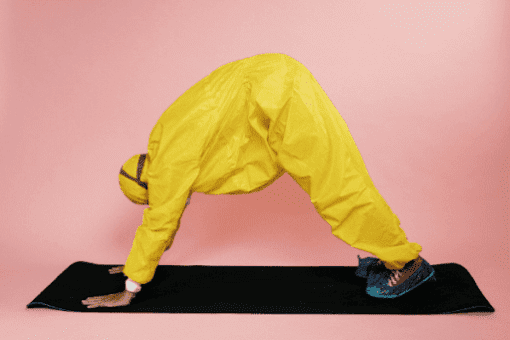Any one of us may not have been directly exposed to the coronavirus, but we each have most certainly been exposed to weight-centric hype during the pandemic. As diet culture is wont to do, any news topic presents the raw material for fear-mongering about weight. Experts assume a cause-and-effect between “obesity” and COVID-19. Quarantine-15 memes abound on social media, and according to the Center for Body Image and Policy at the University of Missouri, over 40% would rather be infected with COVID-19 than gain 25 pounds during quarantine.
Enter: Huntington, New York’s Community Diet
Fearing weight gain more than a deadly disease is the collective mindset that spawns ideas like the Huntington Goes on a Diet Initiative. This program is the brainchild of bariatric surgeon Dr. David Buchin. When the initiative was unveiled to the city in early May, Dr. Buchin stated that the Quarantine-15 refers to the average amount of weight people have gained while in lockdown for approximately seven weeks. While watching the recording of the doctor’s unveiling of his community diet plan, I assumed the doctor was not making a literal statement about weight gain. However, he then unironically motioned to a large bag of potting soil placed before the podium and warned that a weight gain of 15 pounds “is like carrying around that potting soil every day, all day long.” Side note: couldn’t carrying around 15 pounds of anything be considered exercise?
Dr. Buchin claimed that “one of the reasons our country has such a problem with COVID-19: obesity kills about 300,000 Americans every year.” He continued on, citing a recent local study that found “42% of the admitted patients in the hospital are ‘obese.’ [quotes by author] It’s a major problem in our society. That’s why I brought together a few friends to put Huntington on a diet.”
Dr. Buchin’s plan is to offer online fitness & yoga classes. Increasing accessibility for town residents to move their bodies is not a bad thing in and of itself. However, the fitness industry tends to value changing the appearance of one’s body over actual measures of wellbeing. Those who have struggled with an eating disorder are particularly susceptible to diet culture-laden messages about exercise.
Dr. Buchin also added that his diet for the town would include nutrition advice from his bariatric medicine practice. This includes teaching how to “control” emotional eating, as well as how to “avoid comfort foods and high, carbohydrate-rich foods.” These restrictive food rules feed eating disorders and set up an unhelpful dichotomy of good/bad foods for everyone.
Unfortunately, the beliefs about food and weight underlying the Huntington Goes on a Diet Initiative are widespread. They may be accepted as “common knowledge,” but are rarely challenged or fact-checked. So, let’s dig in.
Fact-Checking the Huntington Goes on a Diet Initiative
Claim: Quarantine-15 refers to the average weight gain during lockdown.
How would Dr. Buchin know this? There is no mention of any organized study or survey that collected pre-lockdown and current weights from a representative sample of the population. While patients admitted to the hospital most likely are weighed, most regular doctor’s visits during the shelter-in-place lockdowns and social distancing protocols have been conducted via telehealth, meaning no weighing.
Despite the widespread weight-gain memes like Quarantine-15 and COVID-10, the data do not support significant weight gain during the Coronavirus pandemic. An internet-connected digital scale manufacturer collected data from several countries around the world. The average weight gain is less-than-normal daily scale fluctuations, even for Americans. In short, the Quarantine-15 seems to be urban lore, much like the Freshman-15, which is also a smaller amount than what is typically feared by incoming college freshmen.
But whether people do or do not gain as much as Instagrammers claim is quibbling over a fine point, because body size does not determine health, fitness, or worth.
Claim: “Obesity” kills 300,000 Americans each year.
Although higher weights are associated with some conditions such as diabetes and heart disease, remember the first lesson of Stats 101: correlation is not causation. Far too many research studies do not control for issues such as race and socioeconomic status. Even fewer researchers consider the impact of weight stigma.
Not-so-fun fact: The American Medical Association declared “obesity” an official disease in 2013, going against the recommendation of its own specialized committee.
Claim: “Obesity” leads to more hospitalizations and worse COVID-19 outcomes.
Weight has frequently been reported as an independent risk factor for COVID-19 outcomes. However, the research is incomplete at best, and is rife with bias against higher weights. Dr. Buchin cited the statistic that 42% hospitalized patients are “obese,” therefore this is a problem. However, the Centers for Disease Control reports that 42.4% of the population fell in this size category in 2018. Therefore, the percentage of larger people admitted to the hospital is exactly representative of the population. There has been some acknowledgment that people at higher weights do better than their lower-weight counterparts in some medical situations. This is known as the “obesity paradox.” In truth, it is only a paradox to people who are invested in a fatphobic view of the world. Larger people are not overrepresented. But we do know that people at higher weights get poorer healthcare than thinner people. This can lead to delayed diagnosis and treatment as well as undertreatment, meaning that they don’t get adequate levels of care even when they are treated.
When countries besides the United States are considered, it becomes apparent that weight is not the risk factor it has been portrayed. Case in point: Sweden. Although Sweden’s national “obesity” rate was 20.6% in 2016, considerably lower than the US rate, their COVID-19 death rate is higher per capita. As of May 24, 2020, the US has a COVID-19 death rate of 296.32 per million people; Sweden’s is 392.02. Now, if I had an anti-height bias, I could claim that Sweden’s higher death rate is because they are tall on average. Of course, that would be incorrect, but that is the same reasoning that lies underneath blaming weight for so many ills, particularly medical risks.

©cottonbro from Pexels via Canva.com
Huntington’s Initiative Is Rooted in Weight Stigma
On the surface, the Huntington city-wide diet is touted as lowering risk for residents related to COVID-19. However, it misses the mark. The reasons behind the concept are rooted in fatphobia. Even though the organizers may believe they are helping others, their attempts are likely to backfire, particularly for those who have struggled with eating disorders. The social isolation that is necessary for fighting a virus is an eating disorder’s best friend.
Even if residents are turning to food for comfort during this global pandemic, it is a benign attempt to cope with a remarkably stressful time. There is no shame in eating shelf-stable food or so-called “junk” food. Sometimes the best thing for healing one’s relationship with food and exercise is a generous supply of “forbidden” foods and no exercise for a period of time.
The Huntington Goes on a Diet Initiative does harm by uncritically accepting and perpetuating untrue tenets of diet culture, such as:
- Increased weight causes health problems, including worse outcomes for COVID-19
- Changing our weight is fully within our control
- Eating less automatically leads to lasting weight loss
- Lower weight = healthier = morally superior
- Emotional eating is something that needs to be controlled
- Eating for comfort will automatically lead to weight gain
- Believing there is a hierarchy of good and bad foods
- Thinking there is a hierarchy of acceptable bodies
Barbara Spanjers, MS MFT, is a therapist and wellness coach who helps people feel more attuned with food and their body.
